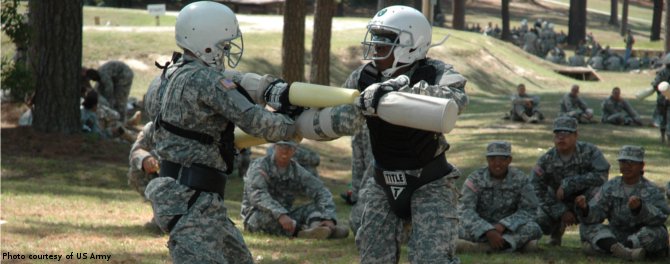Red Phase

When your waiting in RECBN has come to an end, your drill sergeant will march you to your new company area on post. This is where you will stay for the remainder of BCT. When your platoon marches around post, a standard bearer will carry a colored flag that corresponds with your group's status in BCT. The color of the flag changes depending on which of the three phases you are in. The first, or “Patriot,” phase is indicated by a red flag.
Every night, at least two recruits from the platoon are on “fire guard.” Fire guard originated from the days of wooden barracks and wood-burning stoves. Recruits would need to watch the stoves to make sure that the barracks would not catch fire. The present-day fire guard is more an exercise in discipline than a practical necessity. They must be awake to patrol their barracks for anyone trying to leave, cleaning the barracks, and otherwise “watching for fires.” The next pair of recruits on patrol are awoken at the end of their hour-long shift.

Whatever Free Will you have that survived RECBN will be immediately eradicated by your drill sergeant when you enter Red Phase. You have how entered what is best known as Total Control. Recruits find themselves in a position where they are only allowed to do what the drill sergeant says. This is best described as the most dominating game of Simon Says ever.
You only go to the bathroom when your drill sergeant says you can. You can only talk when your drill sergeant says you can. And when you do talk, most of what you will say will be either “No, Drill Sergeant!” or “Yes, Drill Sergeant!” Please note the use of exclamation points. You will not make your drill sergeant strain his or her ears, nor will you put them in a position where they ask you to repeat yourself. When responding to the drill sergeant, you will speak loudly.
Not only does your drill sergeant need for you to speak loudly, but you must also never make eye contact. Your drill sergeant doesn't want you to look in his eyes and see the beauty that lies within his soul. Any attempt to look in the drill sergeant's eyes will subject you to a lecturing about your “eye-balling” him...which usually involved the drill sergeant putting his eyes a fraction of an inch from your eyes so you can see the fiery pits of hell that actually exist within his soul.
Recruits often get to enjoy such exercises as the "bag drill". This training exercise is where all of the recruits' bags are dumped into one large pile and everyone is told to find their personal duffel bags within a set time limit. This, invariably, results in massive failure on everyone's part as chaos immediately falls upon the group. It isn't until the recruits realize that they must work together to complete the task within the time limit.

The second week brings along courses on the seven Army Core Values, sexual harassment, US Army heritage, race relations, and warfare-related subjects (basics of hand-to-hand fighting, first aid training, and navigation). There are several times where you will put your body on the line to demonstrate your warfare knowledge and skills, as well as showing courage. The navigation skills are tested on the Compass Course; divided into teams and challenged to follow a prescribed path. Recruits get to enjoy the sweet scent of tear gas during this week (a day where you might want to only eat a few nibbles at lunch). And get over your fear of heights before you have to conquer the Victory Tower, where you must tackle several obstacles at great heights and rappelling down a 50-foot wall.
You'll be introduced to your M16A2 rifle during the second week. You don't get to shoot it, yet, but you get to learn how to carry it, hold it, point it, take it apart, clean it, put it back together, and what you call it. This is a “rifle,” not a “gun.”

During the final week of Phase I, the drill sergeants will (very slowly) start to move the emphasis of training away from individual, to "team." You'll be assigned a "Battle Buddy," and guess what? Throughout the remainder of Basic, everything your Battle Buddy does wrong, you get the "credit for!" What could be better than that? At least you'll no longer be alone when being "dropped." Your Battle Buddy is like your Siamese twin. You'll go everywhere with him/her and do everything with him/her. Of course, as with all weeks, physical training and drill continue during week three, as well as more training/practice taking your rifle apart and putting it together.

